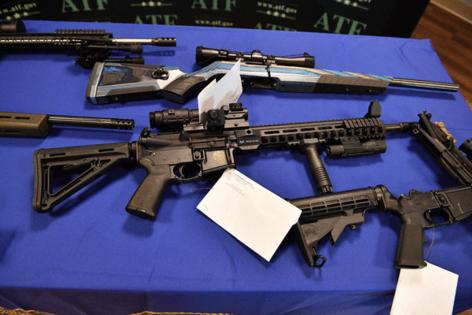Supreme Court upholds ban on untraceable 'ghost guns' that are made from parts kits
Published in Political News
WASHINGTON — The Supreme Court on Wednesday upheld a federal ban on the sale of parts kits that permit unlicensed gun owners to make firearms at home which cannot be traced by the police.
In a 7-2 decision, the justices agreed these homemade weapons, often referred to as "ghost guns," qualify as firearms under federal law.
"Today, thousands of law-enforcement agencies nationwide depend on the [federal] tracing system to link firearms involved in crimes to their owners," said Justice Neil M. Gorsuch for the court.
Justices Clarence Thomas and Samuel A. Alito dissented.
The decision upholds a regulation issued in 2022 by the Biden administration that was strongly supported by police and prosecutors.
The ruling overturns conservative judges in Texas who said Congress had not given federal regulators the power to outlaw "parts kits" that could be assembled into a weapon.
It's a rare win for gun control advocates in the high court.
"This Supreme Court decision is great news for everyone but the criminals who have adopted untraceable ghost guns as their weapons of choice," said John Feinblatt, president of Everytown for Gun Safety. "Ghost guns look like regular guns, shoot like regular guns, and kill like regular guns — so it's only logical that the Supreme Court just affirmed they can also be regulated like regular guns."
Last year, the court's conservative majority blocked a regulation supported by both the Trump and Biden administrations that had outlawed "bump stocks," which allowed semiautomatic weapons to fire rapidly like a machine gun. By a 6-3 vote, the justices said these devices did not fit the definition of a machine gun as set by Congress.
But the court said Wednesday the Gun Control of Act of 1968 broadly defined a firearm as "any weapon ... which will or is designed to or may readily be converted to expel a projectile by the action of an explosive."
Neither case directly involved the 2nd Amendment and its protection for gun rights.
The Los Angeles Police Department and other police agencies have voiced alarm at the growing threat of easy-to-assemble guns that can be bought as kits online.
Three years ago, the LAPD said these "ghost guns are an epidemic not only in Los Angeles but nationwide. ... Ghost guns are real, they work, and they kill."
The Justice Department under Biden told the court that local law enforcement agencies seized more than 19,000 ghost guns at crime scenes in 2021, a more than tenfold increase in four years.
In urging the court to uphold the ban, Solicitor Gen. Elizabeth Prelogar argued the mail-order gun kits could "effectively nullify" gun laws dating back to 1968 that allow police to trace weapons that are used in crimes.
Without the new regulations adopted by the Bureau of Alcohol, Tobacco, Firearms and Explosives or ATF, "anyone could buy a kit online and assemble a fully functional gun in minutes — no background check, records, or serial number required," she said.
California already prohibited the sale of these parts kits, but Atty. Gen. Rob Bonta said the federal ban was needed to enforce a ban on sending these kits through the mail.
Even though California has attempted to curb unserialized guns since at least 2016, he said these weapons accounted for nearly 30% of all guns recovered in the state by the ATF.
Meanwhile, the number of unserialized guns recovered by California law enforcement agencies increased from 167 in 2016 to nearly 12,900 in 2022, a 77-fold increase, Bonta said.
But the conservative 5th Circuit Court in New Orleans was undeterred by the warnings issued by police departments. It struck down the ATF regulation and ruled a "weapon parts kit" is not a firearm, even if it can be assembled into one.
The Supreme Court put the 5th Circuit ruling on hold last year and voted to hear the government's appeal in the case of Bondi vs. VanDerStok.
©2025 Los Angeles Times. Visit at latimes.com. Distributed by Tribune Content Agency, LLC.




























































Comments